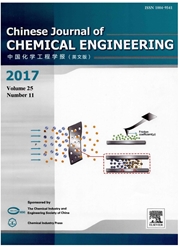

 中文摘要:
中文摘要:
To control the multicomponent reactions in extrusion, reactive-mixing flow in a co-rotating twin screw extruder was numerically studied in the present paper. Effects of initial species distribution, rotating speed and flow rate on a competitive-parallel reaction were investigated and the relationship between mixing and reactions was discussed from the view of chemical reaction engineering. The simulation results show the studied operational parameters, which determine residence time distribution, earliness of mixing and segregation degree of reactive-mixing flows, affect the local species concentration and reaction time and hence have significant influences on the reaction extent. Orthogonal test was adopted to clarify the significance of operational parameters.The analysis shows that initial species distribution and flow rate are the most important factors in the control of reaction extent, and effect of rotating speed is conditional depending on the micro-mixing status of the fluid.
 英文摘要:
英文摘要:
To control the multicomponent reactions in extrusion, reactive-mixing flow in a co-rotating twin screw extruder was numerically studied in the present paper. Effects of initial species distribution, rotating speed and flow rate on a competitive-parallel reaction were investigated and the relationship between mixing and reactions was discussed from the view of chemical reaction engineering. The simulation results show the studied operational parameters, which determine residence time distribution, earliness of mixing and segregation degree of reactive-mixing flows, affect the local species concentration and reaction time and hence have significant influences on the reaction extent. Orthogonal test was adopted to clarify the significance of operational parameters.The analysis shows that initial species distribution and flow rate are the most important factors in the control of reaction extent, and effect of rotating speed is conditional depending on the micro-mixing status of the fluid.
 同期刊论文项目
同期刊论文项目
 同项目期刊论文
同项目期刊论文
 期刊信息
期刊信息
